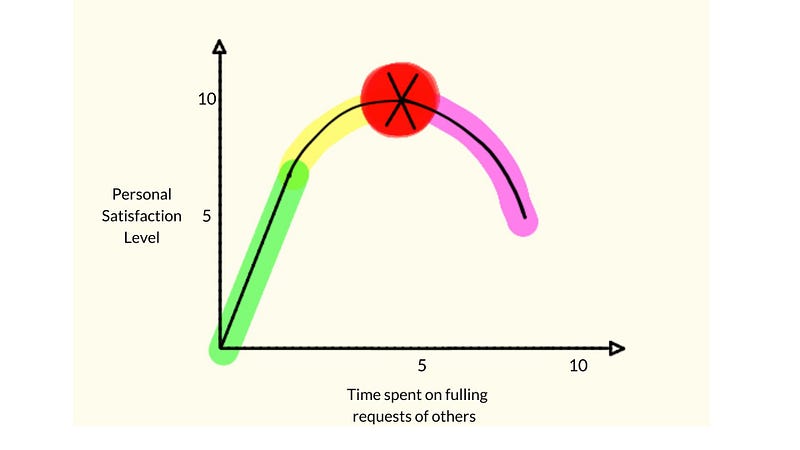Don’t let others dictate your day.

During the ongoing quarantine, many (privileged) people are working from home.
The initial euphoria of working in sweatpants gave way to a new realization: You can easily prioritize the goals of others over your intentions.
Finally, after many days of self-experimentation, I found a way to structure my time in a way that makes me feel satisfied and content.
By following these steps, you can integrate this structure, too.
The importance of prioritizing your own goals
If you’re a people-pleaser like me, you know how good it feels to promptly reply with “yes,” both in private and business context.
Mentor: “I wrote a new article on business transformations, and I’d love to have your opinion on that. Can you feedback?”
Me: “Yes, of course, I’d love to help you with that as I find the article’s topic interesting (and I appreciate our relation).”
Schoolfriend: “Do you want to join our trivia night via Zoom tomorrow night?”
Me: “Sure, I’d love joining our Zoom reunion (as it’s always fun to see you).”
Former boss: “We haven’t talked in a while. I’d love to know which projects you are currently working on.”
Me: “Yes! Let’s schedule a call on which of the following dates are you available?”
Here’s the problem with saying yes to everything: By consistently fulfilling the requests of others, you stop advancing your goals.
In my case, the result of pleasing people is an exhausted, drained, and unsatisfied individual that isn’t looking forward to her next working day.
There will always be a next new exciting opportunity to say yes too, but doing so too often means you say no to your own goals.
Saying no doesn’t mean you can never join any trivia nights again. But it does mean that you work towards your goals FIRST before you prioritize the requests of others.
There is a simple way to evaluate whether you prioritized saying yes to others over saying yes to your own goals: How much progress are you making towards your ambitions?
Is there something you always wanted to do, but “never find the time to” because you keep saying yes to others? How do you feel after a home office day? If your answer is along the lines of “unhappy, dissatisfied, exhausted, drained,” take the chance to change the flow of your days.
You have control of how you feel at the end of a day.
You are in charge of acting on your dreams. If you don’t take ownership of prioritizing your tasks, others will take over with ease. Eventually, you will live the life of others.
Excursion: The diminishing return of fulfilling requests of others
There’s a diminishing return of fulfilling the requests of others. On the x-axis, you see the time a person spends on completing the requests of others at a ten-hour workday (0=0 hours 10=10 hours). On the y-axis, is the person’s personal satisfaction level after a day of work (0=very unsatisfied 10=very satisfied).

The graph demonstrates that fulfilling the requests of others has a diminishing return on your satisfaction level.
The green slope shows that our satisfaction sharply increases with the first hours spent on fulfilling the requests of others.
For me, a day on the green slope means I enjoy my morning routine and focus the next few hours on writing. Only afterward, I focus my mind on fulfilling the requests of others. For about three hours in the afternoon, I enjoy doing good for others, like proofreading a friend’s thesis or checking in with a friend who feels lonely these days. Later afternoon, I shut off my phone again and take the time to do one of my favorite things from this list, like writing a Goodreads review of a book I finished.
The yellow slope visualizes that with every additional hour spent on fulfilling requests of others, your satisfaction levels alters slower. Replying with “yes” and working or helping two more hours of your workday does not do any harm. Being on the yellow slope, you might ask, “What could I be doing instead, that increases my satisfaction level more with the same time invested?”
In the words of economists: “What are your opportunity costs?”.
For me, a day on the yellow slope means I started the day, again, with my morning routine and deep focused work on writing. At lunchtime, I check my inbox and messages. The first hours of helping and replying still feel amazing. But in contrast to a “green slope day,” I continue helping others, while some part of me is longing for other activities. I ignore my need for “alone quality time” and continue helping others.
That behavior is still tolerable. While you could have found more satisfaction in another activity, fulfilling the requests of others is still ok for your satisfaction.
Sounds ignorant? How much good can you do to others if you feel unsatisfied with yourself?
On the pink slope, shit hits the fan with every additional hour spent on fulfilling the requests of others, your satisfaction decreases.
If you already helped other persons for 5 hours that day, any additional hour spent can feel like a burden.
When entering the pink slope, there is no good in continuing fulfilling the requests of others as it drains your energy.
For me, a day on the pink slope starts with my phone interrupting me during my morning routine. I pick up and begin fulfilling the requests of others right away. “There is no time” for working on my writing or podcasting. I continue replying to e-mails.
The thing is, you do not do any good or help society if you give yourself up in helping others.
3 ways to prioritize your goals over the goals of others
1. Know your personal goals and write down the three next steps
Logically, you need to know your life goals to prioritize them. As you are reading this article, you probably know your intentions.
If not, read John Strelecky’s guide on finding your big five for life. Once you know your big goals, break them down into the three next steps.
One of my life goals, for example, is to become a speaker and writer. Why? I want to inspire others to live following their mind, body & nature. As this goal is still kind of abstract, I break it down to three achievements for the next day. Today, for example, goes as follows;
- Distraction-free writing for >2 hours
- Research two strategies for podcast marketing
- Prepare one new podcast episode.
In fact, during the home office, distraction-free working is quite a challenge.
That’s why you need to do another step.
2. Each day, block time for deep work
Next, you need to schedule a time for your work on your calendar. According to behavioral scientist Dan Ariely, your mind is most productive 2–3 hours after waking.
You want to use this time to make progress on your goals. We schedule our meeting times, but we barely schedule deep thinking time for our work.
I start working on my most important task of the day right after waking up (tea+yoga+meditation). I protect the clarity of my mind by rigorously turning off all distractions the night before.
Instead of my phone waking me, I use an alarm clock. I have an alarm clock without the possibility to check any messages or news directly. For my inbox, I use the inbox when ready for the Gmail extension. So, I turn my phone off, and I don’t visit any social media or news sites during my first deep working block.
3. Protect your deep thinking blocks
As demonstrated in the beginning, one readily agrees to help and please other people. Don’t get me wrong. Helping other people is essential and valuable.
I strongly believe that we rise by lifting others. So you should even OFFER help to people you feel you could help. But helping others is even more powerful when you do so while also accomplishing your priorities.
Here is some advice on how to protect your deep thinking blocks
- Only say yes to projects that fully align with your goals or where you are the perfect person to help. To all other frame something like:
“Thanks for reaching out. I appreciate you asking XYZ. It sounds as you’re making great progress at XYZ. Unfortunately, I have to decline your request as I have committed to three big projects. That’s why I decline every other request, regardless of how small, big, interesting, or exciting it might be.” - Maintain a “Said no to list”
On this list, write down everything you said no to before. This list can help you in making a decision when you feel unsure whether to say yes or no. - Bundle “fulfilling the needs of others” into blocks during a day. For example, commit to checking your phone only after you have completed your three most important tasks of the day.
The Bottom Line
Prioritize your goals first, before fulfilling the dreams of others.
Your goal is to reach the sweet red spot where you help others while still taking the time to advance your ambitions.
Prioritize your goals by knowing your priorities.
Then, schedule and protect your deep thinking time.

If you do not take care of advancing your personal goals, nobody will.
What are you going to do less? What is the next request you will say no to make time for what matters most to you?
Get the Mini Post-Grad Survival Guide
A 5-day email course with amazing tips on budgeting, investing, and productivity for 20-somethings. Learn how to spend $40 per week on groceries, among other things, by signing up for free.